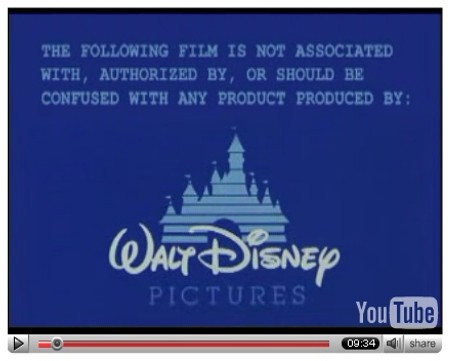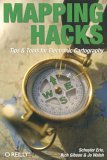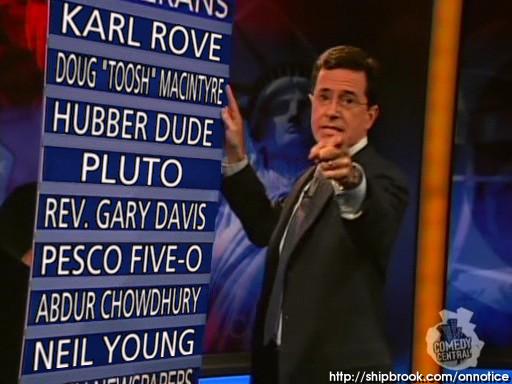August 4, 2007
the killer app for the iphone?
One month into my iPhone experience, I have to say that Google Reader is the killer app for this juicy little telefruit. Actually I suppose I should say, other people's ideas are the killer app, but Reader on the JesusPhone provides a very elegant conduit for bringing those ideas to my brain. What's really great about this is, now I can easily keep up on my feeds in those empty interstitial moments (waiting in lines, riding the train, walking the dog) instead of when I'm sitting at my PC supposedly working, paying bills etc. It's pretty much addictive, and I use it way more than any of the other apps on the current iPhone deck.
It seems like Google is detecting the iPhone, because the Reader interface on the iPhone is different than the normal mobile version of Reader. It also appears they are adding features to Reader to enhance iPhone use. For example, I noticed that the list of feeds changed from a simple list of text links to a formatted list of text links with graphics for the number of unread items, sized nicely for the screen.
At first I was a bit disappointed because there was no "share" button to add items to my link blog. But a fews days later, "share" became a standard part of the interface at the bottom of each item. Thanks Googlers, that was a great addition. I love it when web services get better like that. Anyway, now you will see a lot more stuff flowing through my link blog (feed) as I am reading a lot more feeds and sharing a lot of interesting things.
June 5, 2007
must-see tv: copyright and fair use explained with disney clips
Absolutely brilliant and high-larious educational short that explains the basic principles of copyright and fair use, using a collage of clips from Disney animated films. See if you can count them all: Snow White, Toy Story 1 & 2, Aladdin, Little Mermaid, Lion King, Pinocchio, Monsters Inc, and lots more (there's a full spoilers list in the credits). Done by Prof. Eric Faden of Bucknell, found via teach42.com and the future commons list.
May 3, 2007
the coming age of enraging technology
Lousy design and poor failure scenarios are going to be the downfall of ubicomp systems.
I've been on the verge of a screaming fit twice in the last two days, due to the wonderful digital technologies that are becoming pervasive in my life. And at least twice more, I have just shaken my head in disbelief and shame at the ignorance of certain design engineers. I'm going to tell you about these experiences.
Screaming fit #1. I go to my neighborhood gas station to fill up. Swipe the credit card, start to pump, and nothing. Wiggled stuff, pushed buttons, tried to restart the pump -- finally got 30 cents of gas to flow. The station attendant comes out, asks me to try a different pump so I do, and the same thing happens, this time 25 cents. He shrugs and says they must have run out of gas. So I go down the street to another station, swipe the credit card -- DECLINED. The Visa fraud detection algorithm detected a card theft in progress, and locked me out. Unbelievable, I'm incensed. I don't have my phone, so I steam all the way home and call Visa, where I have to endure a 5 minute automated transaction verification process before I can talk to a person. I'm sorry to say I was not very nice to her, but she cleared the lockout anyway. She offered to let me explain to their security team just how lame their algorithms are, but I couldn't see what good it would do, so I said goodbye.
Screaming fit #2. I go to the united.com website to use online check-in for a flight. It pulls up the right records from the database, but it says it can't find a valid e-ticket for the reservation, so I can't check in. Fine, so I call the United reservation desk. Actually it's a voice response system, one of those you have to talk to. Just knowing this, my BP starts to rise. It asks for my confirmation #, but after three tries of spelling it out, it cannot figure out what I am saying. It asks for flight date, flight number, airport and last name, and finally finds the reservation, but still wants me to follow one of its preprogrammed scenarios. I ask for a human in every way I can think of, but I'm stuck in a voice-response cul-de-sac. Now I'm yelling and cursing at a digital voice synthesizer, and it's not helping anybody. Finally it gives up and transfers me to a human, promising that all the info I gave it will be transferred to the person's screen. It wasn't. I'm sorry to say, I was not very nice to that person either, nor to the next person they transferred me to. After that it got worse before it got better, but you get the picture. Oh, a possible silver lining to this story -- I was told by one of the agents that if you hit "0" or "#" 3 times, the system will send you to a human. Remember that for next time.
Head shaker #1. In our newly refurbished conference rooms, they installed automated control systems for the projector and the conference phone. In order to use these appliances, you have to get up from the table, walk over to the corner of the room, and interact with a little touchscreen panel. Turn on the projector? Walk. Dial the phone? Walk. Mute the phone? Walk. Hang up the phone? Walk. Stupid loser designers, what were you thinking?
Head shaker #2. Same newly rebuilt conference rooms. Ethernet jacks installed into the tabletop, cables carefully shrinkwrapped and routed under the floor. For a room designed to hold 12 people, there are 4 jacks. And three of them are broken in some non-obvious, non user-serviceable fashion. And we're a freakin' computer company, go figure that one out.
I hope ubicomp really does take a hundred years. That way I'll be spared the indignity of having to use it.
February 7, 2007
$1.87 million in virtual goods
Sony Online Entertainment (SOE) has published a fascinating white paper detailing their first year of experience with their virtual goods auction site Station Exchange. I joked about this before, but it has turned out to be a seriously interesting experiment, to the tune of around $1.87M in sell-through (mostly for plats and characters) and $275K in net revenue to SOE. It was pretty controversial when they started this adventure, but you have to give SOE some love for sharing the juicy details of what they have learned so far. For more context, check out Gamasutra's interview with SOE CEO John Smedley.
February 3, 2007
help find Jim Gray by reviewing NASA ER-2 aerial imagery
You have nothing more important to do today. From Werner Vogels, CTO at amazon.com:
Computer science icon Jim Gray mysteriously disappeared after a solo trip with his sail boat outside San Francisco Bay. The coast guard has been searching for 4 days but has not been able to locate anything, not even debris. On Thursday 3 private planes searched through the coastal areas and they also returned unsuccessful.Through a major effort by many people we were able to have the Digital Globe satellite make a run over the area on Thursday morning and have the data made available publicly. We have split these images into smaller tiles that can be easily scanned visually and stored into the Amazon S3 storage service. We then created tasks for reviewing these images and loaded then into the Amazon Mechanical Turk Service.
This is where you come in. We need your help in reviewing these images to see whether you can locate Jim’s boat in any of these images. Please go to the Amazon Mechanical Turk site and help us find Jim Gray.
The weather conditions were not ideal as some areas were cloudy, but we can still look for him in those places where there is a somewhat clear view. We hope to get more satellite data in the coming days of a wider area. The current images are panchromatic with a 0.82m, and Jim boat would be about 6 pixels in size. Please visit the Amazon Mechanical Turk site for more details.
I have to stress that many individuals and companies are to thank for making this possible; many academics friends relentlessly worked around the clock to get access to the data, many industry friends of Jim functioned as connectors to hook up officials and individuals, and people from NASA, Digital Globe, Microsoft, Google, Oracle, Amazon and others worked hard get to the data collected and available on a very short time scale. The Mechanical Turk team worked deep into the night to make this work.
Now it is your turn, go find Jim Gray.
Update 2/3: We have now added the data from yesterdays NASA ER-2 flight to system. They are in a Mechanical Turk Group that is separate the satellite images search. Please follow this link to work on these. More details here
You can also get latest updates on the Tenacious Search blog. Off you go then.
February 1, 2007
view the daily front pages of over 500 newspapers
This is really amazing: the Newseum site provides high resolution images of the front pages of 565 newspapers from 55 countries, updated daily.
The sense of extreme local context that you get from scanning these papers is a quality of newspapers that is largely absent from news on the Net. But the reach of major events that impact globally is also fascinating to see when spread across dozens of newspapers, for example in the Newseum archive of front pages from 9/11/2001.
When it opens in Fall 2007, the physical Newseum in Washington DC will include a gallery of these front pages arrayed on large displays, which should make for a compelling exhibit. But I hope they continue to push the envelope with the online version, as it could become a very powerful interface to our enormous small world.
January 25, 2007
trying out jaxtr
Jaxtr has some buzz and looks interesting. I signed up for the beta; if you want to try calling me on my mobile phone you can click the icon here:
January 24, 2007
suddenly my day sucks
This unpromising message just showed up on my laptop screen. Wonder when my last backup was...

January 23, 2007
six degrees of kevin bacon, redux
This is kind of surreal...Kevin Bacon has started a social network for charity fundraising, called Six Degrees.
I started www.SixDegrees.org in partnership with the nonprofit Network for Good in January 2007, more than 10 years after the game, “Six Degrees of Kevin Bacon” made the rounds of college campuses and lived on to be a shorthand term for the small world phenomenon. It is my hope that Six Degrees will soon be something more than a game or a gimmick. It will also be a force for good.
Hopefully it will have a better run than the original SixDegrees service.
January 18, 2007
gene's readme on future trends in gaming
I'm doing a talk on future trends in gaming tomorrow, and thought it would be useful to share my reading list for anyone that wants to join my little corner of the consensual hallucination we call the future. If I missed something important (undoubtedly), please let me know in the comments.
Virtual worlds and MMOGs
Richard Bartle
The Lessons of Lucasfilm's Habitat (Morningstar & Farmer)
A Rape in Cyberspace (Julian Dibbell)
Play Money (Julian Dibbell)
Terra Nova
We Know (Joi Ito's WoW guild)
ARGs (alternate reality games)
i love bees
ARGN
Avant Game (Jane McGonigal)
42 Entertainment
Transmedia
Technologies of the Childhood Imagination: Yugioh, Media Mixes, and Everyday Cultural Production (Mimi Ito)
Creating and Experiencing Ubimedia
Convergence Culture: Where Old and New Media Collide (Henry Jenkins)
Confessions of an Aca/Fan (Henry Jenkins)
Love and Berry
Game Design & Theory
A Theory of Fun for Game Design (Raph Koster)
Raph's Website
Finite and Infinite Games (James Carse)
Interactive Media Design
USC Interactive Media Division
Carnegie Mellon Entertainment Technology Center
NYU Interactive Telecommunications Program
Banff New Media Institute
Serious Games
Serious Games Initiative
Persuasive Games
Darfur is Dying (mtvU)
Pervasive Games
area/code
IPerG consortium
Geocaching
Waymarking
Yellow Arrow
Mogi-Mogi
'Ere Be Dragons
Sign of the Sorceress ;-)
Ubiquitous Platforms
People, Places, Things: Web Presence for the Real World
Everyware (Adam Greenfield)
Gaming Industry
Gamasutra
IGDA
Game Girl Advance
Game Critics
Kotaku
December 21, 2006
phantom vibes
Nicolas kindly directs us to the Urban Dictionary's definition of 'phantom ring':
Term used to describe when someone thinks they hear their cell-phone ringing or feel it vibrating in their pocket when it’s actually not.
Heh, that happens to me all the time. My front pants pocket vibrates, sometimes even when the phone's not in there, spooky. Sometimes I wonder if the nearby nerves are getting cooked by the radio, causing them to misfire. Should I worry?
December 12, 2006
sure, i need more storage, but hey seagate, here's what i really need
I need a shelf to put it on.
So Scoble points out this contest sponsored by his blogsponsor Seagate (he's a judge), wherein you can win a 750GB(!) external drive. To particpate in this viral marketing stunt, you do a blog post like this one to demonstrate just how mega-desperate you are for more giga-storage space.
Well I do need more space, that's for sure. The lovely 200GB Seagate drive I bought a couple of years ago is getting kind of full, what with the 10,000 photos, 5000 songs, some precious home videos of my family, and backups of 2 desktops, 3 laptops, a server, plus a few hundred lame blog posts. And by way of sucking up, I really do mean it's a lovely product. It's reliable, it's pretty OK looking, and it just works whenever I plug it into whatever machine I own. I'd buy another one without reservation, and I probably will soon since I doubt I'm going to win anything here ;-)
But about that shelf, and I'm serious here. I don't want to keep my drive at home. I want to put my drive on a shelf, at the bank, in the networked equivalent of a safe deposit box. Push a little blue button every now and then, and my backups go whizzing off to the bank. So that if something bad happens at home, all my records, my portfolio of work, my music, my family memories are all safe and sound. By the way, I'm not talking about a shared online storage service; I know those exist and I don't like them. I'm talking about a physical drive that I own, that I have full physical & digital property rights over. So that if the hosting company goes bust, or changes their terms of service in an unfriendly way, or they raise their prices too much, I can go down there and withdraw my data. Empty my box, close my account. And yes, I'd pay for the services that go with that shelf. My actual physical safe deposit box at the bank runs $100 a year, and it holds way less than a terabyte of stuff. So there's a starting point for your value proposition, oh storage marketing gods.
Also, I might be ok if the shelf was from Seagate, brandwise.
And oh yeah, this will effectively double my storage needs, since I'll still want one of those little drives at the house. If that helps, you know. Well in any case, thanks for listening.
November 29, 2006
seven great gifts for that geowanker on your list
With the retail holiday season in full swing, I know you are racking your brain wondering, "Now what do I get for my favorite geowanker and map geek?" Fear not, fredshouse has the answer. Herewith, our list of seven great gifts for the locative media freak on your list:

The Nolli Map of Rome, a large (45"x53") high quality reproduction, $85 from Raven Maps. If you've never seen it, you really must check out the University of Oregon's fantastic Interactive Nolli Map site as well.
HP iPAQ rx5915 Travel Companion (HP website)
A nice consumer-oriented pocket PC media device with WiFi, Bluetooth and SiRFStarIII GPS. Cool, but pricey at $599. [Disclosure: if you buy this it will make my employer's stock go up and I'll be rich rich rich, muah-ha-haaaaa!]

Navicore Bluetooth GPS Receiver
Super-tiny 64x22x15mm (2.5"x0.9"x0.6"), 30g (~1 ounce), 8 hour battery life and supposedly available beginning in November 2006. If you find where to actually buy it, let me know!
Mapping Hacks by Schuyler Erle, Rich Gibson & Jo Walsh, and Google Maps Hacks
by Rich Gibson & Schuyler Erle. Two seminal volumes on neogeohacking, full of fun and interesting things to do with maps, GPS, and web map services. Somewhat technical, but not overly so.
Window Seat: Reading the Landscape from the Air, a very pleasing little book that you should take with you on your next flight. Be sure to ask for a window seat, and not on the wing ;-)
Suunto X9i Wrist-Top GPS Computer Watch (Suunto website)
Amazing wearable toy that integrates GPS, a compass, altimeter, and barometer and apparently even tells you the time. It's not small as watches go, and not cheap at $510, but full geek-toy bragging rights are included.
November 28, 2006
October 15, 2006
return of son of i want my google data privacy
We've been talking a lot about the need for this new service I've been calling "Google Data Privacy" (i'm a bit worried...; i want my GDP; i want my GDP some more, etc), and it might be useful to try defining what it would actually do. I'll try to be realistic about this ;-)
Google Data Privacy is a Google service that would:
- allow me to review what Google knows about me across all their services
- tell me how long they are planning to keep it
- allow me to manage my opt-in & opt-out choices across all my services in one place
- help educate me on the risks and benefits of their holding this data
- describe Google's strategies for safeguarding my data against misuse by Google as a company, individual Google employees, 3rd party companies, the press, the general public, governments, legal process (civil & criminal), and of course bad actors.
- give me a big red button to nuke everything they are keeping about me, in case i want to completely terminate my relationship with Google.
If GOOG were to provide something like this set of features, it would substantially improve my trust in them, and it would help raise the bar on privacy protection for other service providers as well.
Now if Google really wanted to hit a home run with GDP, then I would like to see them create a similar set of capabilities that work for non-Google services -- sort of a personal Internet privacy analytics engine. I can't count on my ISP, my employer, or the myriad of sites and services I use, to provide anything close to GDP, so I want Google to help me with this. I'd be willing to install a new toolbar, or maybe even a special GoogleFox browser, that captured my entire clickstream and gave me the ability to analyze who else my personal data is exposed to, and what has been exposed over time. Where service providers have articulated data retention policies, it would show these as well. GDP might incorporate a set of data privacy and anonymity tools to give me better options for selectively hiding or revealing personal information when needed. Wouldn't that be good?
OK, that's the best I can do right now. Maybe Google can do better than this, in fact, they almost certainly can. What do you think, does this have a snowball's chance?
calling planet google
When it rains...today there's an article in the NY Times called Planet Google Wants You. The story describes the extent to which Google has become an indispensible part of many people's lives, and yet:
The expansion of Google’s reach into so many areas of people’s lives has some worried. Other than the National Security Agency, said Kevin Bankston, a lawyer at the Electronic Frontier Foundation, “I don’t think any entity has ever been in a position to collect so much private data about people.“This kind of profile-building, if it was being done by authorities in a Communist regime, people would immediately object.”
For its part, the company takes “the responsibility of holding our users’ data very seriously,” said an e-mail message from Courtney Hohne, a spokeswoman for Google, which is based in Mountain View, Calif. “We’re thinking about user privacy constantly, literally from the earliest stages of product design.”
Sound familiar? So, Google: now you're being compared to the NSA. Are you thinking about building Google Data Privacy yet?
October 14, 2006
reducing fear is the killer app
Apropos our ongoing flirtation with this idea of Google Data Privacy, I noticed Kathy Sierra just wrote this wonderful, stunning post called Reducing Fear is the Killer App:
The high-pitched screech of the drill. The sickly smell of antiseptic and fear. The long nervous wait for the attendant to call your name and take you... back there. We assume that people are afraid of the dentist, but we don't usually think of software as scary. Maybe we should rethink that. Our users might be more afraid of us and our products than we think. And those who can reduce or eliminate that fear have a huge advantage. Not to mention a passionately loyal following.
Putting this in our current context, is fear a factor where data privacy is concerned? Fear of exposure, fear of betrayal, fear of being sold up the river? Sounds about right to me. Could Google do more to reduce that fear? Absolutely.
But WOW, before you do anything else go read the rest of Kathy's thing; it is a really powerful story with some useful lessons to be learned.
i want my google data privacy some more
Some useful background material for thinking through this GDP thing:
Google's privacy policy, which is actually pretty robust as these things go. Note there are additional policies that apply further to some of their specific services.
The US government's Safe Harbor principles, which underpin most big companies' privacy policies.
The European Union Data Privacy Directive
Electronic Frontier Foundation's Best Practices for Online Service Providers.
EFF's Six Tips to Protect Your Online Search Privacy.
The Center for Democracy & Technology's Consumer Privacy section.
"I want my Google Data Privacy"
My earlier post on Google Data Privacy seems to have resonated with quite a few people. This is great, I think it's a really good discussion to be having. My general sense of most of the responses I've seen is "Google, we like your services and we want to trust you, but we're pretty nervous about having so much of our private data in your hands." One netizen even started a petition to that effect, heh.
I should point out, my original post was pretty much a quick off-the-cuff reaction to noticing how many Google apps I'd been using. I think the idea of "Google Data Privacy" is definitely an interesting starting point, but as stated it was too simplistic and not well thought through. Given the level of interest and also some of the good critical comments, that's something I want to push on a bit.
One point made in various places is that focusing on Google is too narrow; our personal information is held by dozens or hundreds of 3rd parties, mostly beyond our control. I agree, this is not just about about Google. The issue of online data privacy is tremendously broad, and applies equally to all online service providers including ISPs, e-commerce sites, web mail systems, financial services, corporate IT departments, and on and on. Microsoft Live and MyYahoo are obviously similar, just to name two. Our private data is smeared all over the Net, and Google is just one of the more prominent lumps.
What about trust? Some commenters suggested that they trust Google to do the right thing. OK, as long as Google stay true to their roots I think that has some validity. But try this experiment: instead of saying "I trust Google with my personal data", substitute "Microsoft", "Yahoo", "AOL", "NewsCorp", "AT&T", "Verizon", "BT", "Comcast", "HP", "IBM", or "Cisco" and see how you feel. It varies a lot, doesn't it? Yet to a greater or lesser degree and depending on who you are, all of these companies have some level of access to a lot of people's online activity data. So I agree -- a trust relationship can be extremely important, but trust has to be earned and maintained, it can be extremely fragile, and there may be weak links in the chain.
Another issue that has been raised is, could we really expect Google to give its users control over our data in a way that could hurt its business? I don't know, certainly they would have to draw the line somewhere. But let's look at it a different way. We're having this discussion because Google is doing the best job of building a wide range of services that I and lots of other people love and find extraordinarily useful, but also because we're getting nervous about them. It might be in Google's best interest to take the moral high ground on such an important issue, because it's good PR, good for customer loyalty, and good as a competitive differentiator. In other words, it's good business. Google Data Privacy could be a way for GOOG to "do well by doing good."
I think that if Google built GDP, not only would it be good for their own business and all of its users, it would raise the bar for every other online service provider as well. No single company can solve the world's online data privacy problems, but Google has the ability, the cultural heritage, and the industry stature to make a credible step forward.
October 12, 2006
do not play this game if you value your sanity
Thanks a bunch Alex for pointing to the IKEA Game. Do not play it. I repeat, don't go there, you will regret it.
October 6, 2006
i'm a bit worried about this google thing
Update 2006-10-14: Looks like this post resonated with a lot of folks. Thanks Lifehacker, you guys sure do drive a lot of traffic ;-) Thanks also to Tom at HawkWings, Jamais and the many others who linked here. And many thanks to all the commenters, especially those who disagreed here and elsewhere. I've continued the discussion in the post "I want my Google Data Privacy."
Update 2006-10-15: This is worth a read: Lauren Weinstein's Open Letter to Google: Concepts for a Google Privacy Initiative from May 2006. Wonder if he has had a response?
-----------------------------------------------------------------------
I'm feeling increasingly uneasy about my dependence on Google services. I just moved to the new Google Reader because it blows away every other feedreader I've used. I've been a sharpreader fan for a long time, because it was simple, easy and clean, and those attributes outweighed even the huge inconvenience of having multiple unsynchronized opml lists on my various machines. Well now I'm on reader 2.0 and loving it.
So I look around my desktop and I see Google Reader, Google Mail, Google Talk, Google Toolbar, Google Maps, Google Calendar, Google News, Google Analytics, Google Earth, and of course Google Google. Google WiFi was a pleasant surprise when I was in Mt View a few weeks ago, and last night I found pizza (Goat Hill Pizza SoMA, yummy) for the geowanking gig using mobile Google on my phone. All of these things are becoming indispensable tools for me, and I really like using them because they work well and play well, and every few weeks they magically get better.
And hey, isn't it nice to have a single sign-in across all those apps? Oh wait, oops, it's almost like vendor lock-in, but with the added benefit of having my personal correspondence, my friends, family and contacts, my reading lists, my schedule, my location, and my search history all stored under one roof for easy data mining and subpoena! How, er, convenient.
I think I need a new Google product to drop into beta. That would be, let's see, Google Data Privacy. GDP would allow me to review all of the information that Google retains on me across all services, from all devices, and from all sources. GDP would allow me to determine the maximum data retention period for each of my services. GDP would allow me to selectively opt out of cross-service data mining & correlation, even if it reduced the quality of the services I receive. GDP would allow me to correct any inaccurate data in my profile. And GDP would log and alert me when my data was queried by other services.
September 18, 2006
DIY speaker series & blog at USC Annenberg Center
Howard Rheingold and Mimi Ito are hosting a series of talks and online discussions on Do-It-Yourself (DIY) media at the USC Annenberg Center. Looks like a thoughtful and provocative lineup. Backchannel is #diymedia on irc.freenode.net.
August 23, 2006
anime music videos
Maybe this is old news to you, but I didn't know about AMV, Anime Music Videos. I guess it's an obvious thing to mash up popular music with beautiful anime, but this tribe is serious about their art. They even have their own Viewers' Choice Awards. This isn't one of the winners, I just happened on it while looking for something else on youtube: Final Fantasy set to Sarah McLachlan's Angel. Weird, in a nice way.
more discussion on AOL search data ethics
Katie Hafner has a NY Times article today, Researchers Yearn to Use AOL Logs, but They Hesitate. It seems there's been some debate in the academic research community on whether it is ethical to dive into the juicy corpus of the AOL search data. I'm happy to see that Prof. Jon Kleinberg of Cornell decided against using it, but the conflicted views of others quoted in the article are disappointing. As I argued in my original post below, I think it's clearly not ethical for academic researchers to use the data. However, very smart people such as Ed Felten, Danny Sullivan, and Carlo Longino feel otherwise, and their diverse perspectives are instructive.
August 22, 2006
August 18, 2006
August 17, 2006
EFF: how to keep your search history private
The fine folks at EFF have posted some useful tips on How to Keep Your Search History Private.
Don't put personally-identifying information in your searches, at least not in a way that can be associated with your other searches. You should take the precautions below to avoid giving away your identity to your search engine anyway, but they're especially necessary if you want to do a search to see if your personal information has appeared online or want to do a vanity search for your name.
[via Searchblog, thanks for the pointer. Apropos my earlier posts on ethics, John also notes the Bankston/Erickson debate and continues to urge the search engines to take a leadership stand.]
debate on ethics: should web search data be stored?
One more poser vis a vis the ethics of the AOL search disclosure:
Is it ethical for companies to keep logs of online user behavior at all?
This is one question that has been raised repeatedly, long before the AOL release made it visible to everysurfer. There has been a great deal of online discussion on this topic, but I will point you to the WSJ Online, which recently hosted a good debate on this question, Should Web Search Data Be Stored?, between Kevin Bankston of Electronic Frontier Foundation, and Markham Erickson of NetCoalition, a lobbyist for Internet firms including Google and Yahoo.
[Bankston] You also again say that the disclosure should not have happened, yet AOL insists that it was not a violation of its privacy policy to do so. If AOL's privacy policy doesn't protect users' search privacy, and the law (as you argue) doesn't protect search privacy, what are we left with? I'll tell you: a bunch of big companies with a dossier of your personal interests and circumstances more detailed than probably any other single record, which they have no duty to keep secret, and which they have massive economic incentives to mine for marketing data or sell. And since all of the privacy policies pretty much say "we can change this policy at any time," they're useless in the long-term even if they are currently providing adequate privacy protections (which they apparently aren't).The sensitivity of this data cannot be overemphasized, and taking a Wild West approach with no clear rules is a dangerous game. The search industry's customers, and the American public, deserve better.
the ethics of the AOL search data disclosure
I really thought there would be more discussion about the ethical issues around people's use of the AOL search data. Ironically, the only place I have seen this come up is on gossip blog Valleywag (AOL creepy user watch, volume 14: Think of the advocates!). Valleywag, lonely guardian of ethical principles -- what's up with that?
VW points to the WashPo's article AOL Search Queries Open Window Onto Users' Worlds as an exploration of "the ethical dilemma of those who were against these records being released but had such a need to sift through them". Heh funny VW, but painfully on point. Too bad the Post reporters buried the lede in the fourth graf, and then only obliquely criticized the marginal ethics and voyeurism of the examples they cited.
For those of us that don't get to see search logs every day, the novelty and attendant curiosity/nosiness factor of the AOL data were compelling. It's a fascinating story about the human condition, and it surely paid off in traffic and ad clicks for those that reported it. It's not at all surprising that people wanted to know all of the shocking details, we seem to have an unlimited appetite for this sort of thing. But there's a lot about this story that should have raised red flags of an ethical nature, and mostly that doesn't seem to have happened.
So let's make a list of questions regarding the ethics of the AOL search case:
Was it ethical for the AOL researchers to use the data for their research?
Since they maintained end user anonymity in their published results, they are probably okay. One might prefer that the researchers themselves did not have access to end user identities, but this is a gray area. Strictly speaking, one might also wish for informed consent by the subjects of the research e.g., AOL's users, but well, they signed their data away in the AOL data privacy agreement. And gosh, that would be hard to get anyway ;-)
Was it ethical for them to publish the data on the Net?
Given the specificity of the data and the clear potential for identification of individuals, this was clearly an ethical lapse.
Was it ethical for people like me to download the data?
Since a representative of AOL purposefully made it publicly available, it is hard to see a problem with this. Although, my own reaction was "I can't believe they are actually doing this, I better grab it before they take it down", so maybe I shoulda knowed better ;-)
Was it ethical for people that had the data to keep it after AOL took the original data down and issued a strongly worded apology?
Although AOL did not ask this, at this point a strongly ethical person might have decided to delete the data. Should probably have, actually.
Was it ethical to make the data openly available in a searchable form?
Not in my universe. Other folks and other opinions may exist in parallel universes, however.
Was it ethical for people to use the data to publicly identify individuals?
Pretty marginal in my view. You can make a case for doing this with the legitimate purposes of reporting news or demonstrating how bad the disclosure was. But in retrospect, the NYT's disclosure of Thelma Arnold's identity appears sensationalistic and unbecoming. Same goes for the WashPo, which couldn't resist outing JoAnn Whitman in their own article about ethical dilemmas.
Is it ethical for people to continue to use the AOL data for journalistic, research, and commercial purposes?
AOL's readme that went out with the data stated "This collection is distributed for NON-COMMERCIAL RESEARCH USE ONLY. Any application of this collection for commercial purposes is STRICTLY PROHIBITED." So the intent was clear. Are you still crunching the data for SEO or for a news story? Do you sell ads next to your articles? Then you're on the wrong side of this one. If you're doing academic research on it, you're on the wrong side too; remember AOL pulled it down and said it was a mistake. You can't publish results derived from the data, because you no longer have permission to use it.
Well that's my take on it anyway. (:dismounts high horse). I'm interested to hear other opinions on this.
August 15, 2006
google local coupons -- will this work?
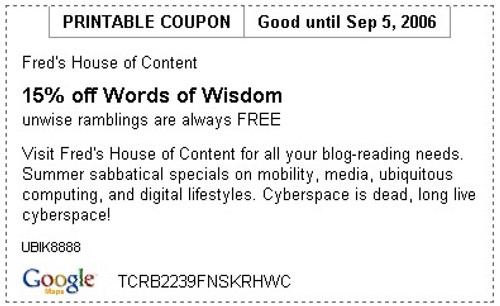
So Google is doing a coupon printing service for local businesses, through Google Maps/Local. I guess this is interesting, although I am not sure how well it will work out. It relies on businesses to set up coupons on Local, which means business owners need to know about it and take the initiative. Then consumers need to find them. Seems like it would require a large investment in awareness building; I would guess the Local user demographic does not overlap much with coupon cutters, although I could be wrong about that. Well, everyone likes to get a deal when they can I suppose.
Google has also partnered with ValPak, the blue-envelope direct mail coupon aggregator, to offer online discount coupons; ValPak already offers printable local coupons at its site, although I would never have thought to go there to find them. So I guess their integration with Local is mostly a distribution agreement.
Of course this is another step toward georeferenced advertising -- see the forthcoming Garmin SaversGuide digital GPS coupon book for example.
More discussion on these fine sites:
Googling Google, NYTimes, TechCrunch, All Points Blog, Search Engine Watch, SiliconBeat, The Merc.
August 8, 2006
the chilling effect of the AOL search disclosure
The NY Times found one: A Face is Exposed for AOL Searcher No. 4417749 (sub req'd).
No. 4417749 conducted hundreds of searches over a three-month period on topics ranging from “numb fingers” to “60 single men” to “dog that urinates on everything.”And search by search, click by click, the identity of AOL user No. 4417749 became easier to discern. There are queries for “landscapers in Lilburn, Ga,” several people with the last name Arnold and “homes sold in shadow lake subdivision gwinnett county georgia.”
It's tempting to point out that there's only 649,999 to go. In other words, the direct privacy implications seem to be relatively small for the vast majority of users in AOL's database disclosure. It's bad, but it's narrowly drawn (of course the impact on AOL's brand perception is a whole other story). But hey, here's a question for you. The Times quotes user #4417749: “My goodness, it’s my whole personal life,” she said. “I had no idea somebody was looking over my shoulder.”
As an experienced Internaut, you knew this all along. But now that you are confronted with hard evidence that Google, Yahoo, AOL and others really are looking over your shoulder and keeping the logs, are you being more careful what you search for?
So where do we go from here? What do you think your rights are with respect to Internet search? Do you think your search is protected against unreasonable search and seizure? Do you believe search is protected speech? That is to say, do you think your search keyword stream is a form of free speech, guaranteed by your (USA) Bill of Rights? If so, then do you think search logs like the AOL data create a chilling effect on your search/speech?
If you are legitimately researching information on illegal or highly controversial subjects, are you going to search from your own computer?
August 7, 2006
AOL discloses 650,000 AOL users' search data
UPDATE: Apparently Findory CEO Greg Linden had the story first. He also makes some level-headed comments about the severity of the privacy breach:
Nevermind that no one actually has come up with an example where someone could be identified. Just the theoretical possibility is enough to create a privacy firestorm in some people's minds.I am as concerned about privacy as any tech geek, but most of my concern is focused on things like millions of credit cards being leaked and millions of social security numbers being lost.
Agreed, for example 196,000 HP employee records including names, addresses, Social Security numbers, dates of birth and other employment-related information (one of them mine) seems far worse.
Further update: The NY Times found one. Also, Andrew Orlowski weighs in on the 'database of intentions' in light of the AOL mess.
====================
Well this isn't going to help AOL's image. Over the weekend, AOL researchers posted a 400MB+ tarball of the raw search query data of some 650K AOL users over the period from March 1, 2006 to May 30, 2006. While users' screen names were "anonymized" by changing them to numbers, individual users' query streams were left intact.
Given the recent widespread outcry over the US government's move to request search data from Google, Yahoo, AOL and others, I can only marvel at the astoundingly poor judgment shown by the research team that did this. Given his position and extensive track record of research and publications, how could this guy not have realized what a Bad Idea this would be? Well apparently someone alerted him, because the data was removed from the AOL site by Sunday evening. Too late, of course; several hundred downloads had already escaped and are already being posted, mirrored and grep'd widely.
There's of course a lot of commentary about this around the blogs:
* Adam at CalTech seems to have been first to pick up the story
* SiliconBeat
* TechCrunch, of course
* Zoli Erdos
I guess by morning you'll see a whole lot more shouting, and I expect AOL will be doing big time damage control. Let's also watch for a couple of other, less obvious things that might/should happen:
* Bloggers refusing to post the data on ethical grounds, even if they got a copy ethically. I have a copy that I downloaded while AOL's site was up, and I'm not posting it (no, it's not on this website so don't bother trying to pwn me please ;-) I guess the real ethical question is, should I delete it?
* On examination of the data, people may realize that in most cases, there will be insufficient data to derive personally identifying information on these users. Yes, there are some disgusting and disturbing query trails that shed an unpleasant light on human obsessions. And yes, there will probably be a few people who can be pinpointed from their search terms. But after a cursory look at the data, I am going to suggest that it's mostly the mundane, everyday, largely anonymous stuff of our online hunter-gatherer lifestyle, and we aren't going to see a huge class action suit or a vast surge in identity theft.
People are going to shout though, and some other people are definitely going to squirm.
May 8, 2006
doppelgoogles
I saw the term 'doppelgoogle' on a mailing list today, referring to the different people with the same name that come up when you google someone. Great word, although technically the usage is a bit off the mark since the original 'doppelganger' generally means a ghostly or shadowy double of oneself, and not simply a namesake. But hey, I'm happy to let the vernacular lead on this.
So my personal doppelgoogles include a fishing boat captain, a family man, an expert on photopolymer plates, and a professor of swine nutrition. Looks like I'm the only one blogging so far, heh.
May 4, 2006
hp aims for edgy
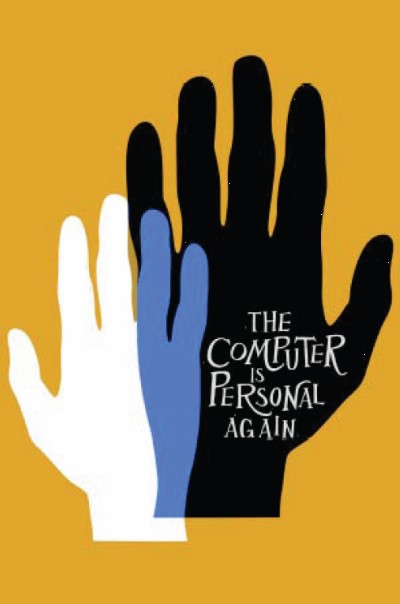
HP also brought the idea for a new reality TV show to MTV, says MTV President Michael Wolf. The studio has created the first of six shows to run over the next six months. In each episode of Meet or Delete, a cast members finds a person -- be it a date, a roommate for a Spring Break road trip, or a guitar player for a band -- by combing through contestants' hard drives. Wolf says the show will be unique, in that it will run on all of MTV's platforms, from its flagship TV shows to its MTV.com Web site. "This is an unprecedented series for us, and an unprecedented campaign," says Wolf. "What better way to learn about someone than through their hard drives?"
Coming soon to a screen near you.
May 1, 2006
insight machine: the sunlight foundation
The Sunlight Foundation officially launched last week.
The Sunlight Foundation was founded in January 2006 with the goal of using the revolutionary power of the Internet and new information technology to enable citizens to learn more about what Congress and their elected representatives are doing, and thus help reduce corruption, ensure greater transparency and accountability by government, and foster public trust in the vital institutions of democracy. We are unique in that technology and the power of the Internet are at the core of every one of our efforts.
They are blogging. For example, I like Ellen Miller's post on Information Mashing and the Accountability Matrix:
Information Mashing. Don't you just love that term? It's one of the major goals of Sunlight and while we've been working on it for the past couple of months we have a ways to go before it happens in any substantial way. Our goal is simple: integrate in a user-friendly way individual data sets (like campaign contributions, lobbyists and government contracts) that makes the whole larger than the sum of its parts.We'd like to create something we've dubbed an "Accountability Matrix." A website where, with one click you can look up a major donor and see not just their campaign contributions, but also their lobbying expenditures, the names of members who've flown on their private jet, the names of former congressional staffers they've hired, and so on.
Exactly: mashup multiple data sources to provide a single comprehensive view, with traceability back to the original sources of the data. Editorial integrity, non-partisan analysis, and reliability/reputation of sources will be critical success factors for Sunlight, but this looks like a very promising step toward the insight machine for US government and politics.
April 28, 2006
context-aware life coaching services
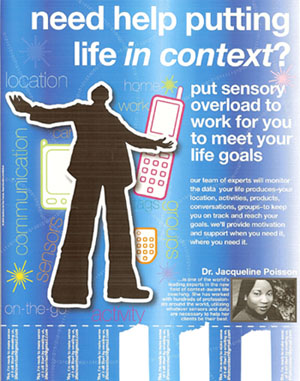
Intriguing ad seen posted on a local bulletin board. The text reads:
"Our team of experts will monitor the data your life produces -- your location, activities, products, conversations, groups -- to keep you on track and reach your goals. We'll provide motivation and support when you need it, where you need it."
The email address for more info is listed as lifeincontext@gmail.com. I haven't tried contacting them.
[via IFTF's Ten Year Forecast program]
April 1, 2006
danah boyd and bill o'reilly, together at last
O'Reilly: "Hey, you got feminist mumbojumbo on my righteous patriotism!"
Boyd: "And you got winger sleaze in my playa dust!"
Two great tastes that go together...happy April Fools Day; these days there's no fiction weirder than *non* fiction.
March 29, 2006
resisting the moral panic over myspace
MySpace has become a hot topic among parents and staff at our school; presumably this is true at most middle and high schools these days, given the heavy media coverage and the predictable hand-wringing about online predators, salacious content etc. Even those uber-bigots at the Family Research Council are piling on:
"Parents need to realize that games people play on computers have changed significantly since they were kids. The harmless games of PacMan and Space Invaders have been replaced by child predators that will invade and destroy the lives of their children."
As danah has been saying, it's a moral panic. One based in parents' fears of poorly defined Internet bogeymen and fueled by a few sensational headlines that create 'truth' by repeated assertion.
Moral panics are a common reaction to teenagers when they engage in practices not understood by adult culture. There were moral panics over rock&roll, television, jazz and even reading novels in the early 1800s... The media, typically run by the parent generation, capitalizes on and spreads the fear with little regard for data or actual implications. Examples are made out of delinquent youth, showing how the object of fear ruined them in some way or other. The message is clear - if you don't protect your kids from this evil, they too will suffer great harm to their minds, bodies or morals.
Some of danah's recent writings on myspace are excellent antidotes to this moral panic. I have been passing these along to our faculty and parent groups, as a thoughtful and credible counterpoint to some of the more strident voices. If you are a parent of a young person, you should definitely read them and then go explore myspace for yourself. If you are a kid, you might like to share them with the authority figures in your life.
"Identity Production in a Networked Culture" (danah's panel talk at the AAAS, yes, that AAAS ;-)
"Friendster lost steam. Is MySpace just a fad?"
more...
January 27, 2006
the medium that is eating the world
Raph Koster gave a talk this afternoon at PARC titled "The Medium That is Eating the World." Raph is a well-known online game designer (Ultima Online, Star Wars Galaxies) and a warm, funny, engaging speaker. His talk today was pretty loosely structured; he wandered around through a bunch of disjoint thoughts about the origin of games, different kinds of media, the definition of play, a bit of kitchen cog sci, and the impact of games on gamers and on the world. Overall it was quite interesting, but I felt like he was trying a bit too hard to be academic and researchy, since the audience was that kind of crowd. Not to take anything away from Raph; he said a lot of very sensible and insightful things and it was well worth attending. Here's a sampling, non-verbatim but captured as closely as I could on the fly:
Some say games are frivolous, from the Latin: “of little value”... but games are arguably a more important driver of human culture than the work you do here [at PARC]... More important than literature, more important than music or art. You have to learn to read, you have to learn to appreciate music, but we come out of the womb naturally into games...Games are here to eat our brains! They are a virus that makes our brains better; they shape us.
Games are a medium – but not the kind we are used to. Games are models. For example, there is the board game model; board games quantize the world into discrete spaces, and progress through turn-by-turn movement. There is the sports model, where rules govern, rules like “reality ends at the white line over there, and that other white line over there. If you have a wormhole at each end, and you try to move a particle around and into one of the wormholes, you've got soccer." Then there is freeform play – the tea party. You might think this is unstructured, free play, but as you with little girls know, there are a hell of a lot of rules to a tea party!
Games teach us a lot of complex concepts. Consider the topology of games. Does checkers happen on an 8x8 square matrix? No, it is played on a diagonal grid in 4x4. Chess happens in some weird, messy non-Euclidean space. Video games like Asteroids exist on a torus. Chutes and Ladders? Just plain odd -- we're teaching 4-year olds about wormholes.
Algorithmic thinking – you can iterate on a game and you get somewhere. Good game designs explicitly provide several algorithmic paths for players to follow, because different players have different styles of play and problem solving. It's kind of interesting that a medium that drives you to algorithmic thinking is arising in a world where algorithmic complexity is high and growing.
Why do we play games? Is it for fun? What is fun? Academics in the field of ludology have come up with a classification of the kinds of fun, of course they go back to the greek and latin roots for maximum understandability ;-): ludus, paidia, Ilinx, vertigo, alea, mimicry. I think this is pretty much bunk. It's too complicated an answer.
Fun is learning. Consider: animals play to learn behaviors that later on help in survival of the species. Fun is an endorphin dump, just like chocolate & orgasm, that you get from playing and learning.
We play to build up models of habits, so you can successfully sleepwalk through life, so you don’t have to pay attention to every behavior, keeping your balance when walking, for instance. You need to build these patterns to cope with a life that is too full of complex information.
If you think about it, most of the games we play build certain habits: killing, aiming, projecting force, assessing arcs, timing actions, collecting, exploring, building, forming tribes, seeking understanding. We like to pretend that a lot of these things don’t matter anymore, in civilized society. But they are still applied in many ways beyond basic survival.
A couple generations of kids have now grown up surrounded by games, by these models. To them, seeing the world as a gamer means…goal-oriented behavior – “whats the objective, and how do I get to it?" [Refers to a book, “Got Game" that talks about how to use a gamer's native skills in the corporate world]. Also quantification and preferring simulation to explication. Gamers are heavily driven by collaboration. Today's gamer is one of a group of mixed gender, sitting on a couch, laughing and talking and solving game problems together. It is tens of thousands of gamers on web forums trying to figure out how to get something off the prostitutes in Grand Theft Auto. A very social medium.
"Is this medium in fact eating the world? 100% of kids age 6-10 are gamers. The kid who isn’t a gamer? Get him into therapy, he is out of step with his age group."
57% of 50-year olds in the UK are gamers too.
So where are games going? There are 2 kinds of video games today: incredibly expensive subpar Pixar-wannabe shoot-the-alien kinds of things, and 90% of them won’t break even. Then there are “pure” games, which are basically "whack the penguin" plus some dressing. One path leads to the holodeck – what academic 'narratologists' call a new form of narrative media, making use of the techniques of traditional storytelling. The other path leads to the models model. Sim city…Tetris to the nth degree. One swallows the other. Models eat the holodeck.
Games aren’t stories, all those legislators that don’t like the content of games are missing the point. Games are models. We can imagine some really big models…can there be a metaverse? When Bill Gibson said 'cyberspace', we misappropriated the word and hung it on the web. When Neal Stephenson said metaverse, we said oh, that's a 3D web. Wrong. The metaverse is a really giant hyperextended game of Quake. It’s a model.
Modern games are composite media, one that starts swallowing up other media. It's easier to imagine every other medium inside games, than to imagine games inside any other medium.
The future of play is ubiquity. The whole world is a game, hey that could be kind of fun ;-)
So your homework assignment is, go home, find a game and play it and see how it makes you think.
Dominic and his friend Sean came to the talk with me, they and two others were the only kids in the entire place. I think they were expecting him to talk more about the games he has designed, but they still seemed to enjoy it. Too bad Raph didn't give them a chance to speak gamer truth to the assembled greybeards ;-)
After the talk I asked Raph what was the hardest problem in game design today. He said cost. In 1985, the best, most graphics intensive game for the most cutting edge platform took 3 man months and $50K. Today, the most graphics rich game for a recent platform costs $35M to make and consumes 150-200 people for a year. He called this 'Moore’s Wall', and referred us to his blog at raphkoster.com. Over there I found a great talk he gave at IBM, Moore's Wall: Technology Advances and Online Game Design which addresses this in depth, I recommend it strongly. Many many other good things on his site as well, be sure to pack a lunch when you go ;-)
cyberspatial reading
Since we're on such a tear about this cyberspace stuff, can I recommend some good background reading? Cyberspace: First Steps by Michael Benedikt, ed. It's a collection of papers and essays by a wide variety of authors on the subject of - what else? - Cyberspace, circa 1991. As such, it is a mixed bag of work where some things turned out to be classics (Morningstar & Farmer, 'The Lessons of Lucasfilm's Habitat', for example) and others turned out to be sloppy mumbo jumbo.
From a perspective 15 years hence, it's an instructive read from cover to cover, beginning with William Gibson's quick but evocative 'Academy Leader' and concluding with a proposal for 'Making Reality a Cyberspace'. Anyway it's out of print but available super cheap from the used bookies.
Assembled word cyberspace from small and readily available components of language. Neologic spasm: the primal act of pop poetics. Preceded any concept whatever. Slick and hollow - awaiting received meaning. All I did: folded words as taught. Now other words accrete in the interstices... I work the angle of transit. Vectors of neon plaza, licensed consumers, acts primal and undreamed of...- William Gibson, Academy Leader
January 25, 2006
"cyberspace" is dead?
Congratulations to IFTF researchers Alex Pang and David Pescovitz on getting an article into the latest Wired ("Cyberspace" Is Dead, Wired 14.02, February 2006). Good on you, gents! This is an outgrowth of the research Alex has been blogging about over at The End of Cyberspace, which you should definitely be reading. In the Wired piece, they asked various thinkers and doers to come up with a better term than "cyberspace" to describe the "world of smart objects, always-on devices, and perpetually open information channels" that we live in. Here's what they got, along with my own snarky editorial commentary:
Steve Jurvetson: "Augmented reality. In competition with virtual worlds and AIs, we will coevolve and internalize technologies to augment reality and our intelligence."
Me: Huh? Okay, so it's a cyberspace (oops!) tag team smackdown pitting us Borg against The Architect and the Tessier-Ashpool cores? Whoa. Anyway AR means something already, and as street jargon it just doesn't roll off the tongue.
Vint Cerf: "I still like [Xerox PARC researcher] Mark Weiser's term ubiquitous computing. It's a world in which the computer would melt into the walls and furniture."
Me: Big, big fan of Weiser's vision. Ubicomp is definitely part of it, but it doesn't cover all the stuff that happens "inside" the network, like MMOGs. Plus, anything that has the word "computing" in it is a non-starter for everyman.
Paul McFedries: "The combination of ubiquity and necessity makes the Net analogous to an atmosphere. I think the replacement word ought to be a play on that: infosphere."
Me: Good effort by the neologist behind wonderful Word Spy, but no cigar IMHO. "info" is too narrow, at least in its common usage, and it misses the physical component entirely. Anyway, just try to say infosphere three times fast, bleah.
Katy Borner: "A global brain, dominated by implants that merge biological creativity with digital resources and speed."
Me: Katy, meet Steve, sounds like you would be good together. But I don't think we're talking about the singularity here, at least not yet.
Neil Gershenfeld: "I'd vote for calling it the world. Information technologies are finally growing up, so we can interact with them in our world instead of theirs."
Me: Ah, Neil you brilliant dreamer. I really like the sentiment, but for most of us plain folk technology is not yet a normal, invisible, accepted part the world we live in. Besides, what fun is it if there's no cool new jargon to describe our cool new existence?
Ross Mayfield (from the EoC blog): on, catalink.
Me: I love "on", because it works really well with "onject"! But I think it falls short because it mostly describes the state of presence ("I'm on") and not the rest of the stuff (flickr, ambient displays, MMOGs, sensornets, etc). Catalink is superbly well-intentioned but esthetically catatonic, sorry.
Notably, Gibson said that the term he originally coined is now "past its sell-by", but he couldn't come up with a better one either.
Okay, so it's easy to be a critic and hard to come up with great neologisms. I'll get to work on that next. In the meanwhile, thanks to Alex, David & their luminarians for stirring the pot with this thought-provoking piece.

